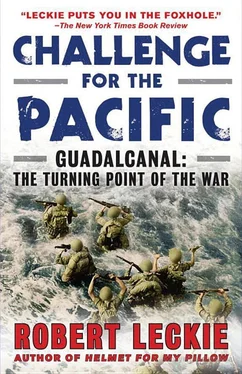It was getting to be dusk of the sixth of August and a quiet was coming over the ships.
Throughout the day the men had been preparing for battle. The winches had been started and the hatches thrown open. On the artillery transports 75- or 105-mm howitzers were hauled aloft and trundled to the gunwales; coils of rope for towing them inland were looped about their stubby barrels. Winchmen on the assault transports brought boxes of ammunition, mortar shells, spare gun parts, and roll after roll of barbed wire on deck. Everywhere was the spluttering sound of landing-boat motors being tested. Their coxswains—many of them from the Coast Guard—stood at the throttle even as these low wooden craft were unlashed and swung out on davits.
The skies were overcast, the air moist and sticky. Sweat oozing from the bodies of men at work made dark patches on the Marines’ pale green twill dungarees and blotched the sailors’ light blue shirts. Tension made the sweat come faster, and the strain seemed more evident on the faces of the sailors. They had been inclined to belittle their passengers. They had scoffed at these “foot-sloggers” who lived like cattle in stifling holds, sleeping on five-tiered mats with their packs for pillows and their noses but a few inches beneath the bulkheads or the bunks above. Sailors accustomed to regular meals and quarters with individual bunks, clean linen, and fresh water could not help but feel superior to men who took salt-water showers and ate on their feet in steaming, pitching mess-halls where the decks were slippery with sweat and spilled coffee, and the food was a kind of tasteless though sanitary swill. But now, on the day before the battle, the sailors saw the Marines sharpening bayonets and knives, inspecting grenade pins and canteens, blacking rifle sights or applying a last light coat of oil to rifle bores; they saw machine gunners carefully folding long, 250-round belts of ammunition in oblong green boxes, or men of their own Navy—doctors and pharmacist’s mates of the Medical Corps—checking the kits and medications with which they expected to bind wounds and perhaps save lives during the morning’s fight. Seeing this, the sailors felt a sudden humility. They felt that they and their ships were secondary and that the true purpose of the war was to get these men to battle, to bring them to the beaches where the width of a shirt rather than of a ship’s armor plate stood between them and the enemy’s steel.

The Marines themselves were in a mood of sardonic gaiety. They listened for the last time to officers gravely informing them that the Japanese soldier was “the greatest jungle-fighter in the world,” a strong, cruel stoic who tortured and killed in the name of an Emperor he believed to be divine, a superman able to subsist on a handful of rice while marching farther and enduring more than any other soldier in the world. Because these Marines had heard this hysterical hokum since it began after Pearl Harbor eight months ago and had finally tired of it, they began to crack jokes or to interrupt the speakers.
“Hey, Lieutenant,” a freckled Southerner on the Elliott called, “ah nevah heard tell of Japs livin’ in jungles. Ah thot most’v ’em was city-slickers like the Yanks heah.”
“Yah-vo, Jawgia,” Johnny Rivers boomed. “But we won’t have to coax them monkeys out of the trees with corn-pone like we did you.” 4
On Elliott’ s fantail a rifleman named Phil Chaffee stood among a circle of grinning Marines. He was talking in a Maine twang, shaking an empty Bull Durham tobacco sack with one hand and occasionally raising the other to twist the ends of a huge curling mustache. “Boys,” he said, “I’m gonter make me a fortune in this here war. I hear all them Japs is got gold teeth. So,” he grunted, pulling an object from his pocket, “I got me m’ pliers, an’ ”—he fished out another object—“I got me m’ flashlight.” The men burst out laughing, and Chaffee snapped: “Laugh, you yardbirds! But I’m goin’ prospectin’. Mebbe they ain’t no King Solomon’s Mines on them Solomon Islands like they say, but I’m gonna get me a sackful of gold anyway.” He grinned and shook the sack. “Pure gold!”
A fresh burst of laughter was silenced by the impersonal voice blaring from the ship’s bullhorn:
“Darken ship. The smoking lamp is out on all weather decks. All troops below decks.”
Aboard all the troopships the men went below. They descended to holds far below the water line, the Catholics to go to confession and the Protestants to chaplain’s services, others to write the last letter home, and some to lie fully clad on their bunks (no one would undress that night) alone with their reveries or their forebodings. In the heads, where the air was blue with tobacco smoke and loathsome with the reek of human refuse, the “showdown” games were being held between the lucky—or skillful—hands into which most of the money had finally settled. Hundreds of dollars would be bet upon the flip of a single card, and when the games ended, the winners would either send the money home via the ships’ post offices or stuff it into money belts bought in San Francisco against just such eventuality.
Up on American Legion’ s officers’ deck Colonel Leroy Hunt entertained his officers with a stylish buck-and-wing, singing his own accompaniment in a deep bass voice. Hunt commanded the Fifth Marines. Like Colonel Cates, he was a distinguished veteran of the fighting in France in World War I, having also been wounded twice, gassed once, and been awarded a half-dozen medals. Hunt’s Fifth Regiment would lead the assault on Guadalcanal next day, with Cates’s First Marines coming in behind him.
It was almost dark now. Major General Vandegrift stood at the rail of McCawley peering into the gathering gloom. Vandegrift was relieved. They had been able to come up on the Solomons’ back door undetected. Surprise should be his. He would need that advantage, Vandegrift thought, because he expected a hard battle. Nevertheless, he was in good spirits. He had done all that he could and now there was nothing more to be done. His conscience clear, Archer Vandegrift felt relieved. Suddenly he became aware of the darkness and of his own bad night vision. He called for an officer to assist him to his quarters, and sat down to finish a letter to his wife.
“Tomorrow morning at dawn we land in the first major offensive of this war. Our plans have been made and God grant that our judgment has been sound. We have rehearsed the plans. The officers and men are keen and ready to go. Way before you read this you will have heard of it. Whatever happens you’ll know that I did my best. Let us hope that best will be enough.…” 5
Belowdecks the lights were out. All was silent save the throbbing of the ships’ motors, the steady breathing of men relaxed in sleep, the quicker gasping of men tense and wide-eyed in the dark. Above, the lights began to go out in the wardrooms. Officers put away their cards and chessboards.
Steaming steadily at twelve knots, the invasion force slipped along Guadalcanal’s southern coast. In the early hours of August 7, 1942, the ships were off Cape Esperance at the island’s western tip. At two o’clock in the morning, by the light of a quarter moon just then emerging, lookouts on the weather decks could make out the round brooding bulk of Savo Island standing sentinel at the entrance to Iron Bottom Bay. Great gray shapes sliding toward an unsuspecting enemy, the ships entered. They split into two groups. The Tulagi force sailed on the northern side of Savo, the Guadalcanal force on the southern. And there was still not a sign from the foe.
Читать дальше













